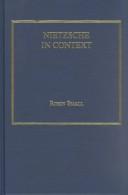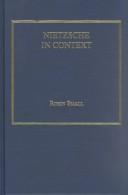| Listing 1 - 10 of 12 | << page >> |
Sort by
|
Book
ISBN: 3319295187 3319295195 Year: 2016 Publisher: Cham : Springer International Publishing : Imprint: Springer,
Abstract | Keywords | Export | Availability | Bookmark
 Loading...
Loading...Choose an application
- Reference Manager
- EndNote
- RefWorks (Direct export to RefWorks)
This book offers a succinct guide to Friedrich Nietzsche’s contributions to educational thought, placing them within the context of his overall philosophy and adding biographical background information that sheds light on his thinking. Topics discussed in detail include theories of knowledge and life, concepts of teaching and learning, and practice and policy issues in modern education. Friedrich Nietzsche (1844–1900) was a major Western thinker with much to say about education, both directly and indirectly. A fierce critic of the schools and universities of his time, he affirms the centrality of ‘culture’ and the exceptional individual as the true aim of education. For Nietzsche, the human predicament is characterised by the tension between knowledge and life. The task of education is to reconcile these demands, but that requires a radical rethinking of knowledge and a re-evaluation of morality. Nietzsche’s new conception of truth replaces facts with interpretations, and certainty with bold experiment. His new virtues arise out of the ‘sublimation’ of drives that are condemned by traditional morality. An education of the future promotes these aspects of individual development. Even so, Nietzsche seems to think that, in the end, it is up to each of us to engage in a broader task of self-realisation, for which he has a cryptic formula: “Become what you are.”.
Education. --- Philosophy and social sciences. --- Educational policy. --- ducation and state. --- Education --- Educational Philosophy. --- Philosophy of Education. --- Educational Policy and Politics. --- Learning & Instruction. --- Philosophy. --- Nietzsche, Friedrich Wilhelm, --- Ni-tsʻai, --- Niče, Fridrih Wilhelm, --- Nīche, --- Nietzsche, --- Nietzsche, Bedřich, --- Nietzsche, Federico, --- Nietzsche, Frédéric, --- Nietzsche, Friederich, --- Nietzsche, Fryderyk, --- Niichʻe, --- Nitche, Fridrikh, --- Nīṭjhśe, --- Nitse, --- Nîtşe, Frîdrîk, --- Nīṭṣē, K̲apreṭarik Villiyam, --- Nitse, Phreiderikos, --- Nītshah, Frīdrish, --- Nit︠s︡he, F., --- Niṭshe, Fr. --- Niṭshe, Friedrikh, --- Niṭsheh, --- Nītshih, Firīdrīk, --- Nit︠s︡she, Fridrikh, --- Nitt︠s︡she, Fridrikh, --- Νιτσε, Φρειδερικος, --- Ницше, Фридрих, --- ניעטצשע, פריעדריך --- ניעטצשע, פרידריך וילהלם, --- ניצי׳שה, פרידריך --- ניטשע, פריעדריך --- ניטשע פריעדריך, --- ניטשע, פרידריך --- ניטשע, פרידריך, --- ניטשה --- ניטשה, פרידריך --- ניטשה, פרידריך, --- ניטשה, פרידריך וילהלם --- ניטשה, פרידריך וילהלם, --- نيتشه، فريدريك،, --- 尼采, --- 尼采弗里德里希, --- Nietzsche, Friedrich --- Nietzsche, Friederich --- Education—Philosophy. --- Education and state. --- Learning. --- Instruction. --- Learning process --- Comprehension --- Education policy --- Educational policy --- State and education --- Social policy --- Endowment of research --- Social sciences and philosophy --- Social sciences --- Government policy
Book
ISBN: 940077656X 9400776578 Year: 2014 Publisher: Dordrecht : Springer Netherlands : Imprint: Springer,
Abstract | Keywords | Export | Availability | Bookmark
 Loading...
Loading...Choose an application
- Reference Manager
- EndNote
- RefWorks (Direct export to RefWorks)
This book is an introduction to Karl Marx (1818–1883) as a radical educational thinker. Marx’s own schooling and education are examined and we see how his interest in educational issues was informed by his own experience. Educational themes in Marx’s thinking are identified: the role of education within capitalist society, the contribution of education to human development and the character of education in a future society. These are placed in a historical setting by the author and related to public debates over educational policy. Throughout his career, Marx identified education as key to the prospects of the working class. The story of this engagement adds a new dimension to the picture of his work as a philosopher, political economist and socialist revolutionary. The aspects of education that concerned Marx matched prominent features of his theoretical and political activity, and educational themes provided him with a critical application for many of his most important ideas. The author explores Marx’s work on the British factory school system, his use of evidence from the reports of school inspectors, and the contemporary movement that led to the establishment of modern systems of public schooling. The final chapter relates Marx’s thinking to questions about the place of education in today’s society, showing how relevant it is for the twenty-first century. These discussions contain new scholarship, draw on original sources and are written in a clear and readable style. Students in education courses at universities and colleges, educational researchers and teachers will find this examination of Karl Marx’s ideas concerning education both engaging and enlightening.
Education. --- Education --- Philosophy. --- Children --- Education, Primitive --- Education of children --- Human resource development --- Instruction --- Pedagogy --- Schooling --- Students --- Youth --- Educational Philosophy. --- Philosophy of Education. --- Sociology of Education. --- Civilization --- Learning and scholarship --- Mental discipline --- Schools --- Teaching --- Training --- Education—Philosophy. --- Philosophy and social sciences. --- Educational sociology. --- Education and sociology --- Social problems in education --- Society and education --- Sociology, Educational --- Sociology --- Social sciences and philosophy --- Social sciences --- Aims and objectives

ISBN: 0199278075 0191602701 9786611190811 1435621123 Year: 2005 Publisher: Oxford Clarendon
Abstract | Keywords | Export | Availability | Bookmark
 Loading...
Loading...Choose an application
- Reference Manager
- EndNote
- RefWorks (Direct export to RefWorks)

ISBN: 075460540X 0754605396 Year: 2001 Publisher: Aldershot Ashgate
Abstract | Keywords | Export | Availability | Bookmark
 Loading...
Loading...Choose an application
- Reference Manager
- EndNote
- RefWorks (Direct export to RefWorks)

ISBN: 1138255823 1315249626 9781351919616 135191961X 9781315249629 0754653293 9780754653295 9780754653295 9781138255821 9781351919593 1351919601 Year: 2016 Publisher: Abingdon, Oxon : Routledge,
Abstract | Keywords | Export | Availability | Bookmark
 Loading...
Loading...Choose an application
- Reference Manager
- EndNote
- RefWorks (Direct export to RefWorks)
Education --- Philosophy. --- Marx, Karl, --- Knowledge --- Education. --- Éducation. --- Éducation --- Philosophie. --- Marx, Karl --- Makesi, --- Ma-kʻo-ssu, --- 马克思, --- 馬克思, --- Marukusu, --- マルクス, --- Marx, Heinrich Karl, --- Marks, Karl, --- Marx, Carlos, --- Marks, K. --- Marŭkʻŭsŭ, Kʻal, --- 마르크스, 칼, --- Marksŭ, --- 맑스, --- Marks, Karol, --- Mác, Các, --- Marx, Karel, --- Marksas, Karolis, --- Marx, Carlo, --- Mác, C., --- מארכס, --- מארכס, קארל, --- מארכס, קרל, --- מארכס, ק --- מארקס --- מארקס, קארל --- מארקס, קארל, --- מארקס, קרל, --- מארקס, ק. --- מרכס, קרל --- מרכס, קרל, --- ماركس، كارل --- ماركس، كارل، --- Markso, Karlo, --- Education - Philosophy. --- Marx, Karl, - 1818-1883 - Knowledge - Education. --- Marx, Karl, - 1818-1883

ISBN: 9780754604167 0754604160 Year: 2001 Publisher: Aldershot: Ashgate,
Abstract | Keywords | Export | Availability | Bookmark
 Loading...
Loading...Choose an application
- Reference Manager
- EndNote
- RefWorks (Direct export to RefWorks)
Digital
ISBN: 9789400776579 Year: 2014 Publisher: Dordrecht Springer Netherlands
Abstract | Keywords | Export | Availability | Bookmark
 Loading...
Loading...Choose an application
- Reference Manager
- EndNote
- RefWorks (Direct export to RefWorks)
This book is an introduction to Karl Marx (1818–1883) as a radical educational thinker. Marx’s own schooling and education are examined and we see how his interest in educational issues was informed by his own experience. Educational themes in Marx’s thinking are identified: the role of education within capitalist society, the contribution of education to human development and the character of education in a future society. These are placed in a historical setting by the author and related to public debates over educational policy. Throughout his career, Marx identified education as key to the prospects of the working class. The story of this engagement adds a new dimension to the picture of his work as a philosopher, political economist and socialist revolutionary. The aspects of education that concerned Marx matched prominent features of his theoretical and political activity, and educational themes provided him with a critical application for many of his most important ideas. The author explores Marx’s work on the British factory school system, his use of evidence from the reports of school inspectors, and the contemporary movement that led to the establishment of modern systems of public schooling. The final chapter relates Marx’s thinking to questions about the place of education in today’s society, showing how relevant it is for the twenty-first century. These discussions contain new scholarship, draw on original sources and are written in a clear and readable style. Students in education courses at universities and colleges, educational researchers and teachers will find this examination of Karl Marx’s ideas concerning education both engaging and enlightening.
Philosophy --- Sociology of education --- Teaching --- Educational sciences --- onderwijsfilosofie --- onderwijs --- onderwijssociologie --- kapitalisme --- Marx, Karl
Digital
ISBN: 9783319295190 Year: 2016 Publisher: Cham Springer International Publishing
Abstract | Keywords | Export | Availability | Bookmark
 Loading...
Loading...Choose an application
- Reference Manager
- EndNote
- RefWorks (Direct export to RefWorks)
This book offers a succinct guide to Friedrich Nietzsche’s contributions to educational thought, placing them within the context of his overall philosophy and adding biographical background information that sheds light on his thinking. Topics discussed in detail include theories of knowledge and life, concepts of teaching and learning, and practice and policy issues in modern education. Friedrich Nietzsche (1844–1900) was a major Western thinker with much to say about education, both directly and indirectly. A fierce critic of the schools and universities of his time, he affirms the centrality of ‘culture’ and the exceptional individual as the true aim of education. For Nietzsche, the human predicament is characterised by the tension between knowledge and life. The task of education is to reconcile these demands, but that requires a radical rethinking of knowledge and a re-evaluation of morality. Nietzsche’s new conception of truth replaces facts with interpretations, and certainty with bold experiment. His new virtues arise out of the ‘sublimation’ of drives that are condemned by traditional morality. An education of the future promotes these aspects of individual development. Even so, Nietzsche seems to think that, in the end, it is up to each of us to engage in a broader task of self-realisation, for which he has a cryptic formula: “Become what you are.”.
Philosophy --- Philosophy and psychology of culture --- Sociology --- School management --- Didactics --- Teaching --- Educational sciences --- onderwijspolitiek --- onderwijsfilosofie --- sociologie --- didactiek --- onderwijs --- sociale filosofie --- opvoeding
Book
ISBN: 9781138296275 Year: 2018 Publisher: London ; New-York : Routledge Taylor & Francis Group,
Abstract | Keywords | Export | Availability | Bookmark
 Loading...
Loading...Choose an application
- Reference Manager
- EndNote
- RefWorks (Direct export to RefWorks)
Book
ISBN: 9781441189653 Year: 2010 Publisher: London ; New York Continuum
Abstract | Keywords | Export | Availability | Bookmark
 Loading...
Loading...Choose an application
- Reference Manager
- EndNote
- RefWorks (Direct export to RefWorks)
| Listing 1 - 10 of 12 | << page >> |
Sort by
|

 Search
Search Feedback
Feedback About UniCat
About UniCat  Help
Help News
News